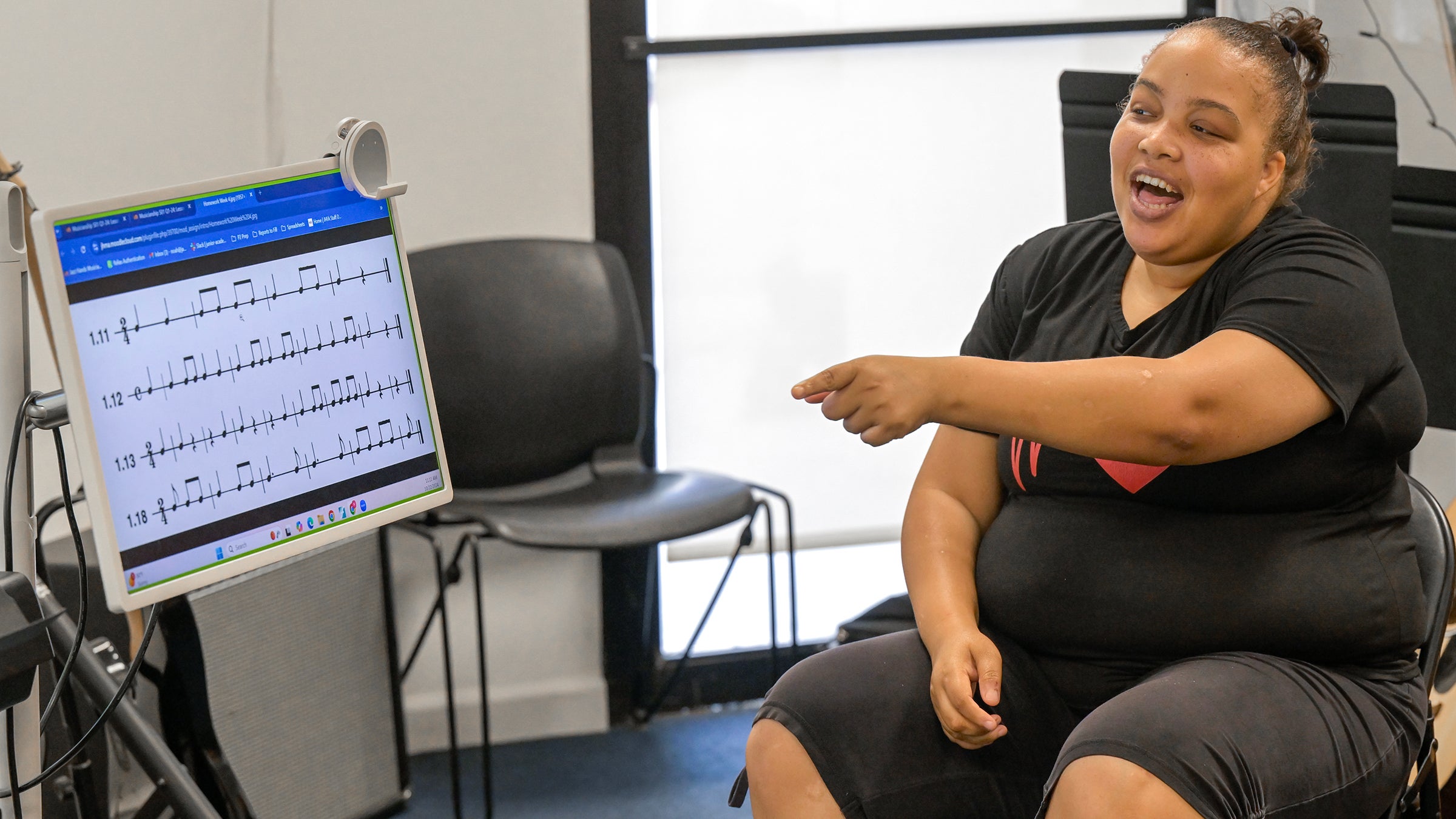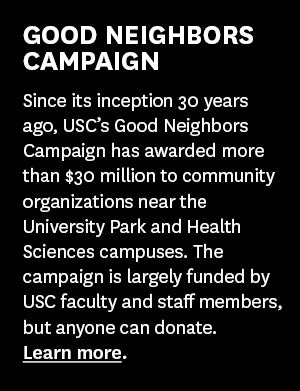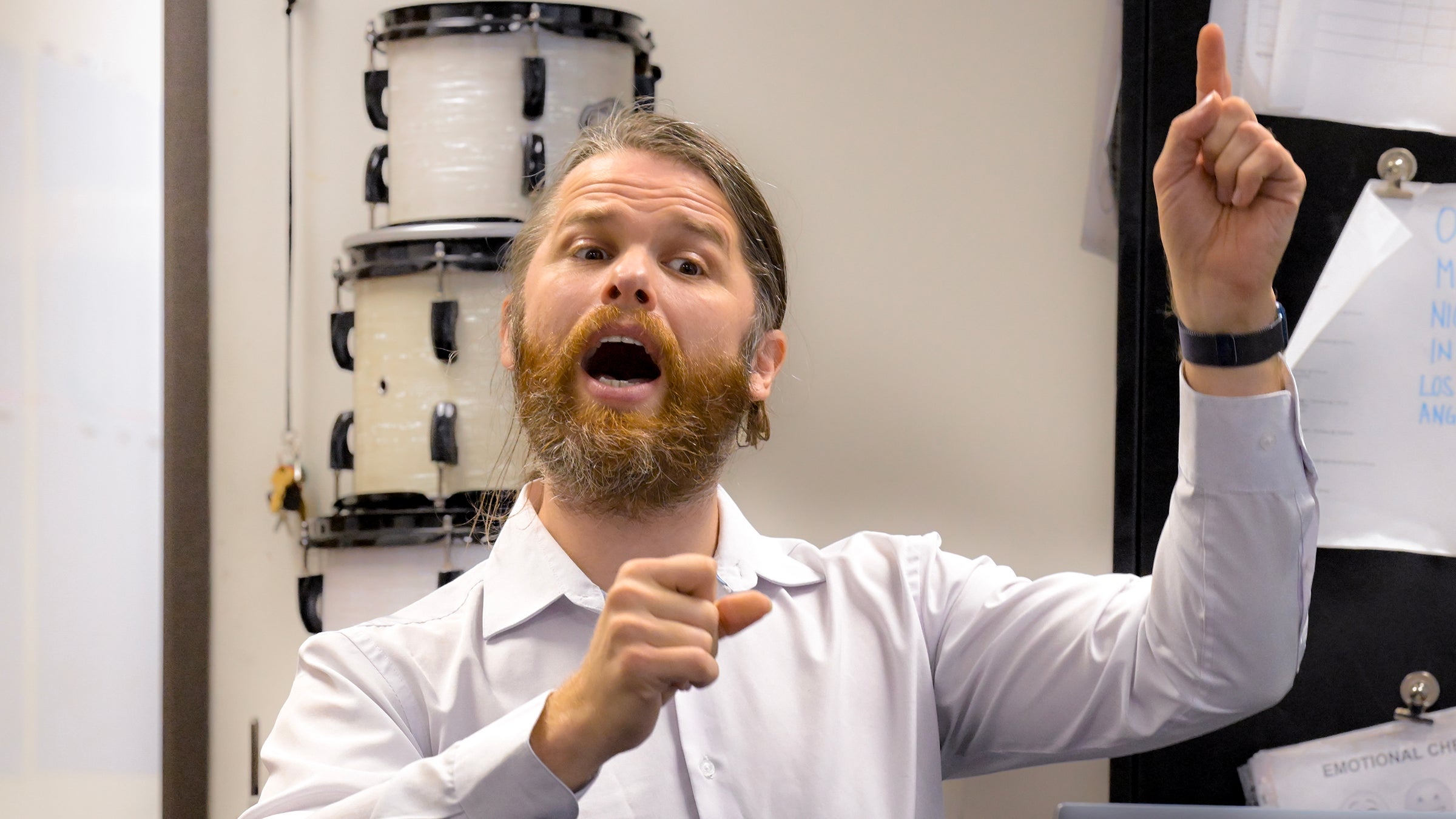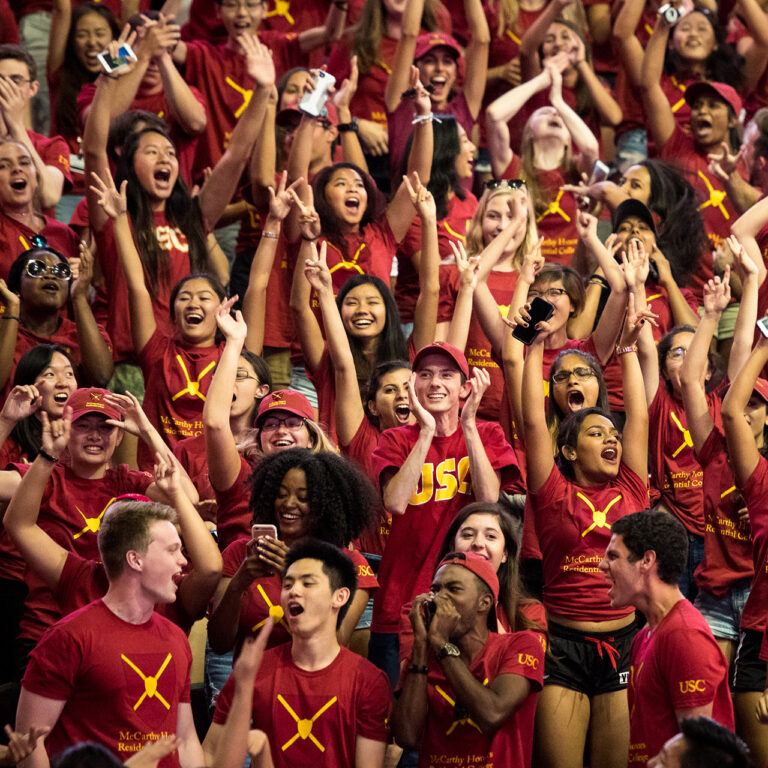Music instructor Noah Donnelly, right, teaches Georgette Cummings (far left), Brandi Pollard and Sam Williams during a musicianship class at Jazz Hands For Autism. (USC Photo/Gus Ruelas)
Social Impact
At Jazz Hands For Autism, student abilities hit a high note
The organization, founded by a USC alumna and supported by the university’s Good Neighbors Campaign, helps neurodivergent individuals gain musical skills for self-expression and career development.
On a recent Tuesday, a small group of adult students gathered in a Culver City classroom for a lesson reminiscent of one from The Sound of Music.
“Do, re, mi, fa, sol,” they sang in unison.
The students were learning solfège, a system of pairing musical pitches with syllables. They took turns singing the notes from sheet music in a variety of progressions as they kept the rhythm with hand gestures. When student Brandi Pollard stumbled on a note, her classmate Georgette Cummings chimed in to help her find the right pitch.
“Teamwork makes the dream work,” Cummings said.
That moment of collaboration proved as integral to the lesson as singing the correct notes.
The class is part of the conservatory program within the Musicians Academy at Jazz Hands For Autism, a nonprofit group founded in 2014 to help individuals on the autism spectrum gain not only musical knowledge but also greater comfort navigating social situations.

“One of the challenges that many individuals with autism have is socialization,” said Ifunanya Nweke, the founder and director of Jazz Hands For Autism. “Music helps them connect to other people and build social skills and confidence. Our whole goal is to empower individuals who have autism to know that they have something of value to give and to participate in the reciprocity of community.”
The organization offers myriad opportunities for musical enrichment, including twice yearly concerts, group jam sessions and a junior academy for children ages 8-17. But the centerpiece is the Musicians Academy, which provides conservatory-level music education to prepare adults on the autism spectrum for professional careers in music. Participants specialize in one primary instrument and select one of five career tracks: on-stage performance, songwriting/composition, music technology, music business or music pedagogy. They also receive individualized career coaching and job placement assistance.
Nweke notes that adults on the spectrum often struggle to find and keep stable employment, due to several factors including narrow interests and challenges understanding social situations. A 2017 study found that nationwide, adults with an autism diagnosis have an unemployment rate of around 40%, a figure Nweke estimates is now much higher.
 “Many individuals with autism show an inclination toward music, so why not use music as a tool to build belonging and build pathways to employment?” Nweke said.
“Many individuals with autism show an inclination toward music, so why not use music as a tool to build belonging and build pathways to employment?” Nweke said.
Joining hands with a good neighbor
Since 2020, Nweke and her staff have been developing their own tech-enabled curriculum for the Musicians Academy to meet the unique needs of neurodivergent learners and track their growth and progress in concrete ways. They’ve been supported in part by grants from USC’s Good Neighbors Campaign, which awarded more than $1 million to 54 community organizations for the 2024-25 academic year. The campaign marks its 30th anniversary this year, and since its inception has awarded more than $30 million to community organizations near the University Park and Health Sciences campuses. Good Neighbors is largely funded by donations from USC faculty and staff.
Jazz Hands For Autism received Good Neighbors grants for the 2021-22 and 2022-23 academic years. Now, for the 2024-25 academic year, a Good Neighbors grant of $27,650 will allow Jazz Hands For Autism to continue adding courses for students and begin developing a training program that will empower music educators throughout Los Angeles and beyond with tools and strategies to teach, include and engage their neurodivergent students. This educator training program will also expand the curriculum’s reach far beyond the roughly 45 students the organization currently serves each year.
“Good Neighbors has been a huge ally and partner in helping us refine and improve our curriculum and our program structure,” said Nweke, a USC alumna. She earned her master’s degree in nonprofit leadership from the USC Price School of Public Policy and her doctorate in educational leadership from the USC Rossier School of Education.

Ninety percent of Jazz Hands For Autism’s students do not pay out of pocket for their music education. As a vendor of the California Regional Center system (entities that provide resources for those who are developmentally disabled and their families), Jazz Hands For Autism receives compensation for direct services such as the music training classes and career coaching sessions.
However, “the funding doesn’t cover things required to grow our impact, like curriculum development,” Nweke said. “Grants like the Good Neighbors grant really help us to be able to innovate and grow and improve the services that we’re offering to students without having to charge them extra to do that.”
Jazz Hands For Autism: The sweet sounds of success
The Musicians Academy has opened up a variety of career doors for students. Participants have taught music classes in local schools, performed for Los Angeles Mayor Karen Bass, DJed for Culver City’s Fiesta La Ballona and formed bands that have played legendary Los Angeles-area venues including The Viper Room and Whisky a Go Go.
Jazz Hands For Autism also built the first music library that features compositions and songs exclusively by neurodivergent composers, singers and producers. The goal is to place music in film, television and advertising as a source of passive income for these musicians.
“L.A. is a very, very competitive musical city,” said Nweke, who is a singer-songwriter herself. “We leverage every single avenue that is available to help our musicians break in.”
Pollard, 31, is an example of the kind of multihyphenate musical artist that the Musicians Academy produces. As a student in the music pedagogy track, she plans to become a music teacher, but she also hosts Jazz Hands For Autism concerts, performs as a vocalist and gives presentations at elementary schools for students with special needs. She said that music provides a vehicle for storytelling, one she uses to share her own story of neurodiversity.
“Music helps me connect with people,” Pollard said. “I want to continue building the community throughout my teaching career.”
She cited singer-songwriters like Kelsea Ballerini and Maren Morris as some of her musical influences. At Jazz Hands For Autism’s fall concert on Nov. 23, Pollard will be performing “Take Me Home, Country Roads” by John Denver. She said she selected the song to match the concert’s theme, which is “Going Places.”
Even as Jazz Hands For Autism students are poised to go significant places in the music industry, Nweke emphasized that job placement isn’t the only measure of the organization’s impact.
“Beyond the jobs, their joy and their confidence and their ability to communicate and connect with other people — and their ability to collaborate with other people at Jazz Hands and outside of Jazz Hands — are also outcomes of success,” Nweke said.
